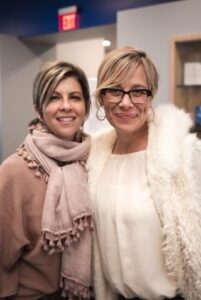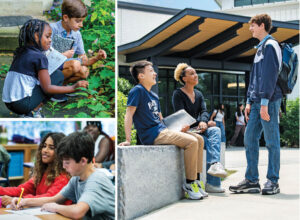On a quiet evening in mid-September, Roseanne Liberti was sitting at her MacBook Air, headphones in, working diligently on Adobe Audition. Roseanne, a former AFS Middle School teacher, had put in hours upon hours of work over the last few months sound mixing, editing, cutting and splicing, but the product seemed to finally be coming together. From the outside watching her work, one would only be able to hear presses on the keyboard, the clicks of the mouse—otherwise, silence. But Roseanne had nearly been brought to tears by the triumphant sounds that she heard in her headphones, a two-and-a-half minute trailer for a podcast with fellow former AFS English teacher Jenny Burkholder, with whom she had spent the much of the summer planning, recording and structuring the stories that needed to be told.
“It was like midnight, but I couldn’t wait,” recalls Roseanne. ”I shared it with Jenny. I listened to it like five times, then ten times. And I started to weep. I had never worked so hard to learn how to do something like this. I couldn’t believe we put together something so beautiful.”
What they had put together was the first season of OVERexpressed & OUT, a podcast hosted by the pair to find space for women to tell stories about how they transform very personal suffering into outward expressions of healing. So far, guests on their podcast have included writer and non-profit leader Jacinta White; Living Beyond Breast Cancer CEO Jean Sachs P’14; and GetMoPhit Founder and AFS alumna Morgan Burrell ‘15. And the AFS connections don’t stop there: the visuals are created by Nicole Kurtz ’14, and the music was composed and performed by Kindergarten Teacher Raji Malik.
 They have a twin-like ability to finish one another’s sentences, and three sentences don’t pass without one of them bursting into laughter at the other’s jokes. Their chemistry is undeniable; a podcast, inevitable.
They have a twin-like ability to finish one another’s sentences, and three sentences don’t pass without one of them bursting into laughter at the other’s jokes. Their chemistry is undeniable; a podcast, inevitable.
Their road to podcasting was a winding one, and it began back at Abington Friends School. Jenny and Roseann had been working in separate divisions for nearly 10 years—Jenny in Upper School, Roseanne in Middle School—until a serendipitous venture onto the Quaker Action Committee (QuAC) brought the duo into more direct contact. As they worked with other committee members to develop programming and curricular guidance related to Quaker life at the school level, a friendship was born.
But as with all stories, complicating factors are introduced. A poet like Jenny might refer to it as a volta; a science teacher like Roseanne might call it friction. On December 31, 2019, Jenny was diagnosed with metastatic breast cancer. She finished that school year, which included the first ten weeks of the pandemic and teaching online, but left at the end of the school year. The next year, Roseanne received a diagnosis of ovarian cancer, and five days later was in surgery – and finished with her time at AFS. In the span of twelve months, two long-time faculty members had been unexpectedly ushered into early retirement.
Their stories have led them to radically new places in their lives. Jenny Burkholder trained for six months to be a Living Beyond Breast Cancer Hear My Voice Metastatic Breast Cancer Advocate. “It allows me to see basically what’s right in front of me,” she says. She started writing a weekly blog at overexpressed.blog about her diagnosis and began doing the important work of sharing her story. “On the healing journey, advocacy becomes really important. We wanted to do something that would highlight other people’s voices. We didn’t want it to be about us.”
Of course, recording a podcast is a lot of work. Roseanne assumed control of producing the show, giving herself a three-month-long crash course in sound engineering before the launch. But even though the episodes are twenty minutes long, the recordings can go for upward of an hour, with lots of sidebars, digressions, and jokes. Roseanne can’t keep from laughing as she brings up some of the technical and social difficulties they experienced during their first recordings.
“We learned that Jenny has some unique sound issues in her home studio,” she says with a smirk. “We learned that we’re going to have to edit out Remy (Roseanne’s dog and the show’s Mascot) chewing in the background. And we learned that you can’t just jump into an interview. People need to be comfortable. There’s lots of warm up.”
“And a lot of silence,” Jenny adds.
As it turns out, a lot of the skills needed to podcast are similar to their skills gained during decades of teaching—especially the kind of active listening that is the foundation of a Quaker education. Good podcast hosts like Jenny and Roseanne thrive both in noise and in silence. Anyone who knows them might be surprised to hear that—the pair exude confidence and never seem at a loss for what to say. But silence is often necessary in order to achieve that perfect episode.
“We tell our guests that we will occasionally sit there for a moment reflecting on what they’ve said—which is very informed by Quakerism and QuAC and our time at AFS,” explains Jenny. “Of course you can’t have that in the end product, so we cut out that silence. But the silence is foundational to it.”
In a Quaker school, most everyone is familiar with silence. In addition to the standard quiet expected during test and quiz periods, classes begin and end with silence and worship involves long stretches of it. But silence can be difficult to make room for in our lives, especially with the ever-present digital noise of social media buzzing in our ears and pockets. Jenny and Roseanne, who have had years of engaging in the practice of silence at AFS, feel like they have a leg up on other podcasts with less structure—and probably, less silence.
“We recorded all three interviews in June, but then sat with them through July, through August, and we didn’t really see the story of them until September,” explains Roseanne. “We wanted to see where the stories led us. And honestly, that speaks to us as teachers. I can speak for myself as a Middle School teacher, a lot of it is about listening to what a child shares before figuring out what they need from you as a response. It’s a lot of listening—and you can’t listen if you’re talking over them.”
“A good podcast is like a good story is like a good lesson,” says Jenny. “The podcast has a frame just like a good English class. You go from point a to point b, but how you get there might be different than you expect.”
The duo have already started recording season 2, which launched on December 1. But they already have a season under their belt, and they’ve picked up a number of lessons. When Jenny and Roseanne sit down in their Elkins Park studio to record, sometimes with their guests across from them and sometimes recording virtually, they know that there has to be warm up: Just because the mics are on does not mean that the words are going to flow freely. You have to cultivate a space that feels intimate and joyful and sincere all at the same time—only then are guests going to feel comfortable enough to tell their authentic and personal story. Sometimes that means raucous energy, with frequent asides, frantic tangents and bursts of laughter punctuating the airwaves with much-needed levity. Sometimes it means hearing the guest and saying nothing at all, letting the silence hang in the air as they contemplate their responses. After all, Roseanne can always edit it later.
“We’re not Terry Gross yet,” jokes Jenny, “but we’re getting there.”

